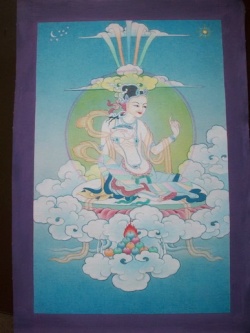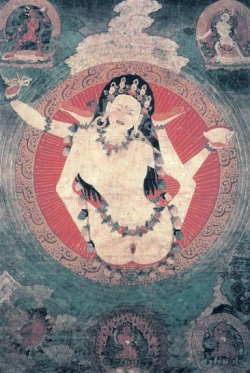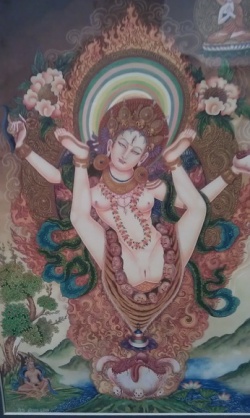Sukhasiddhi story by Ngawang Zangpo
Sukhasiddhi's accomplishment equaled that of Niguma. Although they were both born in Kashmir, there is no record of any meeting between them. They are cited together only as teachers of the same disciple, Kyungpo Naljor, yet according to the Nyingma tradition, they are related from past lives. Jamgon Kongtrul writes in The History of the Sources of the Profound Treasures and the Treasure Revealers (p. 32b), that Niguma in a past life was none other than Mandarava, Guru Rinpoché's foremost Indian disciple. The identification of Sukhasiddhi with Yeshé Tsogyal, Guru Rinpoché's foremost Tibetan disciple, and with her reincarnation as Machik Labdrön, is well known.
Sukhasiddhi arrived at tantric Buddhism late in life. She lived as an impoverished housewife and mother of six children until the age of fifty-nine. She was thrown out of her home by her husband and children, who were irate at what they considered her misplaced generosity to a stranger who came begging at their door. She wandered westward to Oddiyana (Swat Valley in modern Pakistan), where she acquired a measure of grain, with which she made alcohol. Her business proved a modest success, and she allowed herself to again be generous, this time to a female adept referred to as Avadhuti-ma, who regularly bought alcohol for her companion, an adept in retreat.
Sukhasiddhi's gift of free alcohol intrigued the adept, Virupa, who asked whether his surprising benefactor wanted to receive Buddhist teaching. She did. Sukhasiddhi's story relates that she brought as offerings to Virupa two containers of alcohol and some pork. Although this meeting predates the Muslim domination of India, pork and alcohol were far from what would have normally constituted suitable offerings for spiritual teaching, even to tantric masters. Nevertheless, Virupa was no normal master, and Sukhasiddhi would prove an exceptional disciple.
Upon receiving empowerment and instruction from Virupa, Sukhasiddhi, then a sixty-one-year-old, attained full enlightenment that very evening. Like Niguma, her body became rainbowlike. Niguma is remembered as a wrathful, dark-brown woman who wore bone ornaments, whereas Sukhasiddhi is portrayed as a peaceful, light-skinned sixteen-year-old.
Niguma's teachings make up the bulk of the Shangpa Instruction Lineage's meditation practices, yet it is Sukhasiddhi who occupies the center of the sacred circle when Kyungpo Naljor's masters are recalled. Kyungpo Naljor himself testified to her central position, as quoted in The Story of the Wisdom Dakini, Sukhasiddhi, Whose Other Name [in Tibetan) is Déwé Ngödrub (Accomplishment of Bliss):
Among my four principal spiritual masters, Niguma, Rahula, the hidden yogi [probably Métripa], and Sukhasiddhi, the kindest was Sukhasiddhi. Her first great kindness was the bestowal of many transmissions. Her later great kindness was to be my secret consort and to grant me every empowerment. Her final great kindness was to give me directions for giving empowerment, along with profound instruction in meditation. Moreover, she said she would remain inseparable from me throughout India and Tibet, a very great kindness, and that meditators in future generations would gain accomplishment by experiential cultivation of this secret meditation she taught. (The Collection of Shangpa Masters' Biographies, pp. 56-57) In fact, Sukhasiddhi kept her promise to appear to future lineage holders, notably to each of the first four lineage holders after Kyungpo Naljor, and has thereby revitalized and added to the Shangpa teachings over the centuries.
If we compare Niguma and Sukhasiddhi's contributions to the Shangpa lineage, Niguma's definitely outnumber those of Sukhasiddhi, but both taught Great Seal and a series of meditations called the Six Doctrines (each very different from the other and from those of Naropa, although the subjects are the same).
Niguma's and Sukhasiddhi's biographies have one thing in common. Both women reached as high a level of realization as any of the great Indian masters without the drama that we have come to associate with Dharma (Buddhist religious practice), particularly that of the early Marpa Instruction Lineage. In looking at the Marpa lineage masters' lives, we might wonder, "Does the path to enlightenment have to be so excruciating?" Niguma and Sukhasiddhi would answer, "No." While it's true that Naropa and Milarepa in particular had difficult spiritual lives, we should recall that they were particularly difficult characters. Before his awakening, Naropa had been a brilliant Buddhist university professor, one of the best of his time. Yet his tight, solid, self-assured mind was so unfit for meditationr instruction in the mind's nature, that his teacher had him undergo hardships instead. For his part, Milarepa had practiced black magic and killed forty people before meeting his teacher.
Naropa and Milarepa were not average people and did not follow an average path to awakening. Their stories are well loved throughout the Himalayas, but Tibet's Buddhists also know many other "templates" for the path to enlightenment. While we might not be able to attain enlightenment in an evening or a week, as Niguma and Sukhasiddhi did, we can absorb that possibility into our outlook. Things can be light and easy—we receive pith instructions from a qualified teacher and we give ourselves permission to allow the teachings to guide us to awakening. It could be as simple as that. And so it was for our two uncomplicated, straightforward dakinis.
New Buddhist converts must confront the inevitable influence of their former religion's presentation of the spiritual path, which in the case of the Judeo-Christian tradition is not necessarily good news. Whether or not new Buddhists had actually practiced in that tradition, the pervasive influence of Judeo-Christian culture has given most of us a deep, reflexive expectation that a spiritual path will involve something along the lines of dark nights of the soul, suffering, painful ego death followed by glorious spiritual rebirth, and so on. While such a template seems incredibly dramatic and foreign to Buddhism, it is perfectly "normal" if we recall that Western culture, both religious and secular, has been deeply influenced by the idea of original sin, the opposite of Buddhism's intrinsic enlightenment or primordial purity. Niguma and Sukhasiddhi were unburdened by such debilitating expectations; they were "pure" Buddhists who did what all Buddhists should—they became pure buddhas. Fortunately for them and for us, no one told them that enlightenment was beyond them or that the path had to be long and arduous.
The Melody of Great Bliss: A Supplication to the Wisdom Dakini Sukhasiddhi by Jamgon Kongtrul
Bestower of uncontaminated, coemergent bliss; Radiant with the full splendor of sixteen-year-old youth; Leader of every assembly of dakinis in the three locations— Venerable Accomplishment of Bliss (Sukhasiddhi), to you I pray.
You manifested in a pauper's home in Kashmir And trained in realization on the path. Having completed the force of faith and great compassion, You diligently gave gifts without attachment; to you I pray.
Millions of eons ago, you perfected the cultivation of merit and wisdom And the result of your training manifested. The awakening of your karmic connections Made you renounce home life; to you I pray.
In the land of Oddiyana, source of great mysteries, Men were spiritual warriors; women, female warriors. Just by your reaching the center of that gathering, The power of your enlightened potential awakened; to you I pray.
You demonstrated the skillful means of illusory conduct as a vendor of delicious alcohol. You gave twice-strained rice alcohol to a female adept. This created a connection through faith With a tantric practitioner in the forest; to you I pray.
Noble Virupa accepted you as his disciple And gave you the full four empowerments into secret practice. Instantly, your ripened karmic body of sixty-one years Became that of a sixteen-year-old maiden; to you I pray.
Taking the inner path, you truly traversed in a single moment The major vajra stages of awakening, And you appeared in an uncontaminated, vajra rainbow body. Powerful one of the celestial realms, to you I pray.
You became the manifest form of coemergent wisdom, Buddha Selfless One, To remain until the end of cyclic existence. You watch over the three realms' beings during the six periods of day and night. Honored female buddha, to you I pray.
You manifestly bless those who pray to you And lovingly watch over your children who preserve your lineage, never parting from them. You bestow common and supreme accomplishment in a matter of months or years. Powerful one of great compassion, to you I pray.
Vajra Yogini, perfection of transcendent knowledge, You appear to help beings in a body that has form. The exquisite flower of your body, which one never tires of seeing, Blooms with the marks and signs of physical perfection; to you I pray.
In the Teaching's infinite gates, which have the nature of emptiness, You speak according to beings' dispositions. Your speech, invincible sweet sound in every situation, Flows imbued with the sixty tones of Brahma's voice; to you I pray.
Inseparable bliss and emptiness, the true vajra of space, Pervades all animate and inanimate life. Your sublime enlightened mind of luminous Great Seal Is coemergent and uncontaminated; to you I pray.
Epitome of the qualities of freedom and maturity, You have an inconceivable life. Just hearing your voice inspires uncontaminated bliss. Sublime wish-fulfilling jewel, to you I pray.
You unite in pleasure with all victors and bodhisattvas. Your emanations reach the four elements' limits. Like an excellent vase, a gem, or a wish-fulfilling tree, Your enlightened activity is spontaneously present; to you I pray.
Your compassion knows no distance and embraces all equally. You guide fortunate persons on the path to the celestial realms. Your loving face wears the conscientious smile of compassion. Friend to all beings, to you I pray.
To your child who preserves the lineage and who prays to you, Show your loving face and joyfully grant me your supreme prophecy. Bestow the empowerment of great vajra wisdom, And bless me that I merge inseparably with you.
Excerpted from Timeless Rapture, by Ngawang Zangpo.


